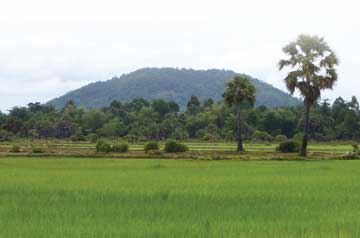|
NEWS NOTES — NEWS
Biogeosciences
Genetic discovery yields stronger plants
 Carolyn Gramling |
| Rice paddies in low-lying coastal areas such as these in Cambodia are susceptible to salt, as sea levels rise and saltwater intrudes inland into freshwater systems. Researchers are working to develop salt-tolerant rice plants to combat such challenges. |
Researchers have discovered a gene in a variety of rice that allows rice plants to grow better in low-nutrient conditions and may in fact actually enhance plant growth. The discovery may aid in the development of salt-tolerant plants, which are becoming increasingly important as agriculture necessarily begins to move into less arable land.
Excessive amounts of sodium — or any nutrient — can be toxic to plants. Worldwide, large areas are affected by salt-related problems in both soils and water, says Rakesh Kumar Singh of the International Rice Research Institute (IRRI), based in the Philippines. The U.N. Food and Agriculture Organization suggests that as much as 8.34 million square kilometers (834 million hectares) are affected by salt worldwide, with South and Southeast Asia accounting for about 1.05 million square kilometers (105 million hectares) of that. “This is the second largest problem among abiotic stresses, after drought,” Singh says.
Rice is a staple food for more than half the world’s population and provides the primary food source for 2 billion of the world’s poorest people. Researchers have therefore been working to develop different strains of rice that can survive the changing conditions. Rice is generally susceptible to salt, Singh says, but it has enormous variability for salt tolerance partly because it is often grown in coastal areas where saltwater intrusion is a perpetual problem. Still, “this is definitely going to worsen with the higher sea levels due to climate change and more frequent water inundations,” he says.
Rice researchers have already developed flood-tolerant rice that can survive complete submergence for days at a time, and are working on aerobic rice that can survive much drier or even drought conditions, and rice that can tolerate rising levels of salinity, says Duncan Macintosh, also of IRRI. The new study, published by Tomoaki Horie of the University of California at San Diego and colleagues in The EMBO Journal on June 20, found that in one variety of rice, a genetic mutation allowed very low concentrations of sodium to enhance rather than degrade plant growth under certain conditions, such as when levels of other nutrients like potassium are low.
This is first time that a molecular explanation of sodium uptake and its regulation, independent of potassium uptake, has been pointed out, says Abdelbagi Ismail, also of IRRI. “Sodium uptake is a major problem under saline conditions and this study could form the foundation for the genetic manipulation for optimum sodium uptake for better tolerance,” he says.
The findings correspond with what other researchers have found, Singh says. This study is somewhat of a first step, however, as the researchers considered relatively low salinity levels compared to some of the extremes faced in the real world. But if this research contributes significantly toward understanding and improving rice’s tolerance at higher salt concentrations, then it would be helpful, he says. Gaining a better understanding of specific traits or characteristics in crops is very important, Macintosh adds, as new discoveries allow researchers to genetically modify existing crop varieties and develop stronger, more productive plants that in the end will aid in making agriculture more flexible and adaptable to climate change.
Links:
"The Agricultural Impact of Global Climate Change: How Can Developing-Country Farmers Cope?" Geotimes, April 2007
International Rice Research Institute

 Subscribe
Subscribe


